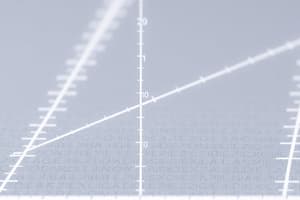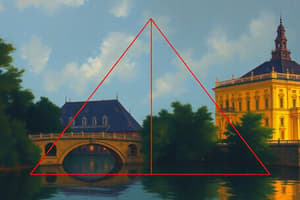Podcast
Questions and Answers
What is the distance between the points (2, 3) and (4, 1)?
What is the distance between the points (2, 3) and (4, 1)?
- $4$
- $5$ (correct)
- $3$
- $2$
The coordinates (-5, 7), (-1, 3) are collinear.
The coordinates (-5, 7), (-1, 3) are collinear.
False (B)
The distance between the points (0, 0) and (36, 15) is ___.
The distance between the points (0, 0) and (36, 15) is ___.
39
What type of triangle are the points (5, -2), (6, 4), and (7, -2) the vertices of?
What type of triangle are the points (5, -2), (6, 4), and (7, -2) the vertices of?
Which of the following points are equidistant from (2, -5) and (-2, 9)?
Which of the following points are equidistant from (2, -5) and (-2, 9)?
Match the geometrical figures with the correct property:
Match the geometrical figures with the correct property:
What is the equation used to find the distance between two points?
What is the equation used to find the distance between two points?
The points (-1, -2), (1, 0), (-1, 2), (-3, 0) form a rectangle.
The points (-1, -2), (1, 0), (-1, 2), (-3, 0) form a rectangle.
Flashcards are hidden until you start studying
Study Notes
Distance Calculations
- Distance between points (2, 3) and (4, 1) can be calculated using the distance formula: (d = \sqrt{(x_2 - x_1)^2 + (y_2 - y_1)^2}).
- For points (-5, 7) and (-1, 3), apply the same distance formula to find the result.
- For general points (a, b) and (-a, -b), the formula leads to a consistent relation regardless of specific values.
Specific Distance Example
- The distance between (0, 0) and (36, 15) can be determined using the distance formula, yielding a specific numerical result.
- This distance can then be compared to the distance between two towns A and B, analyzing if known values apply.
Collinearity Analysis
- Determining if points (1, 5), (2, 3), and (-2, -11) are collinear requires checking if the slopes between any two pairs of points are equal.
Triangle Type Check
- To verify if points (5, -2), (6, 4), and (7, -2) form an isosceles triangle, calculate the distances between each pair and assess if at least two distances are equal.
Quadrilateral Shape Confirmation
- Assess points A, B, C, and D for whether they form a square by checking the distances between adjacent points and the diagonals.
- Evaluation of points (-1, -2), (1, 0), (-1, 2), and (-3, 0) to determine if they form a specific quadrilateral, justifying the claims with distance measures.
- Repeat for points (-3, 5), (3, 1), (0, 3), (-1, -4) and (4, 5), (7, 6), (4, 3), (1, 2) to classify the shape.
Equidistant Point on x-axis
- Finding a point on the x-axis that maintains equal distance from (2, -5) and (-2, 9) involves setting up the equation using the distance formula, leading to a solution for the x-coordinate.
Distance Constraints
- Establishing values of y that maintain a fixed distance of 10 units between points P(2, -3) and Q(10, y) requires solving the related distance equation for y.
Studying That Suits You
Use AI to generate personalized quizzes and flashcards to suit your learning preferences.



